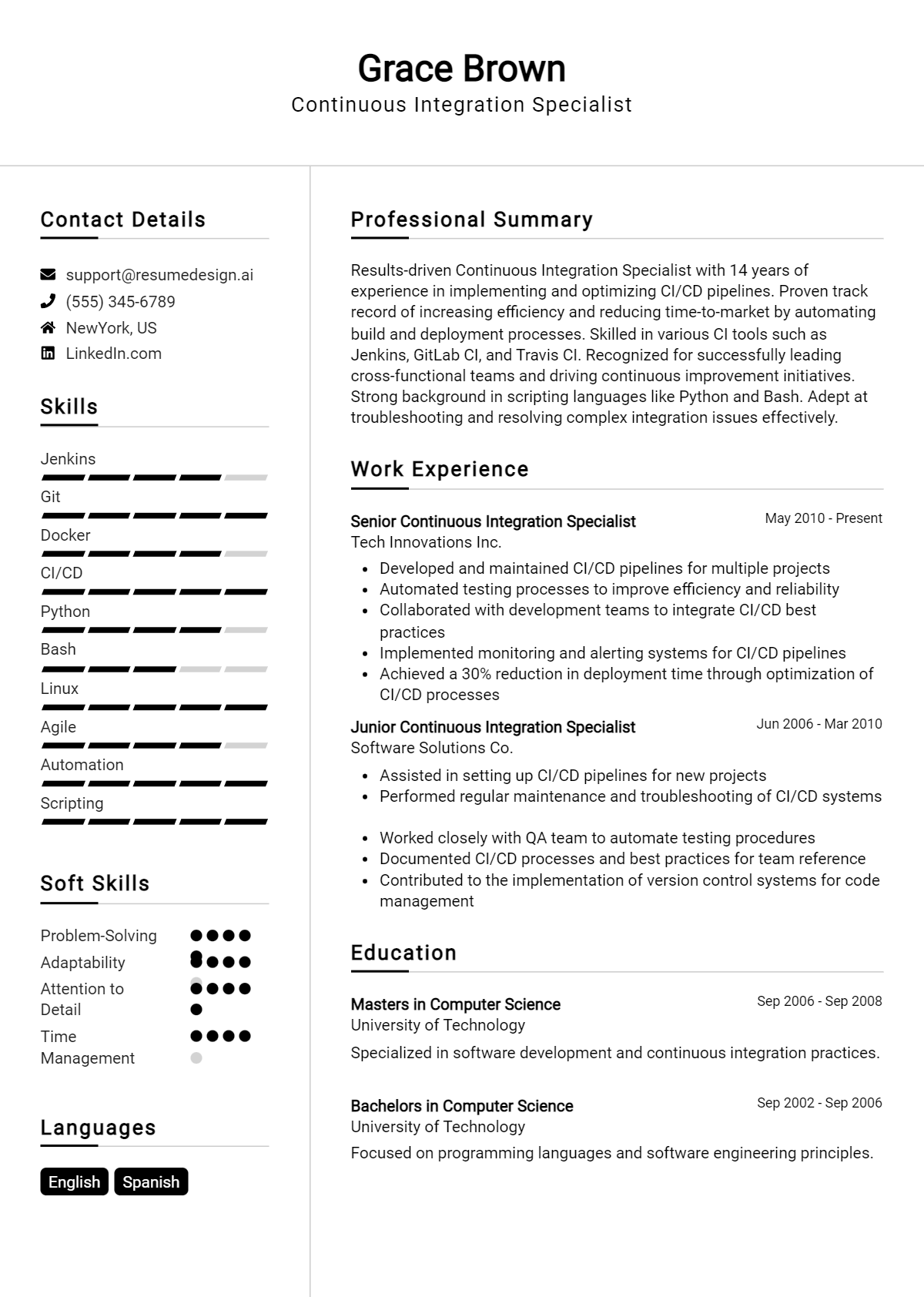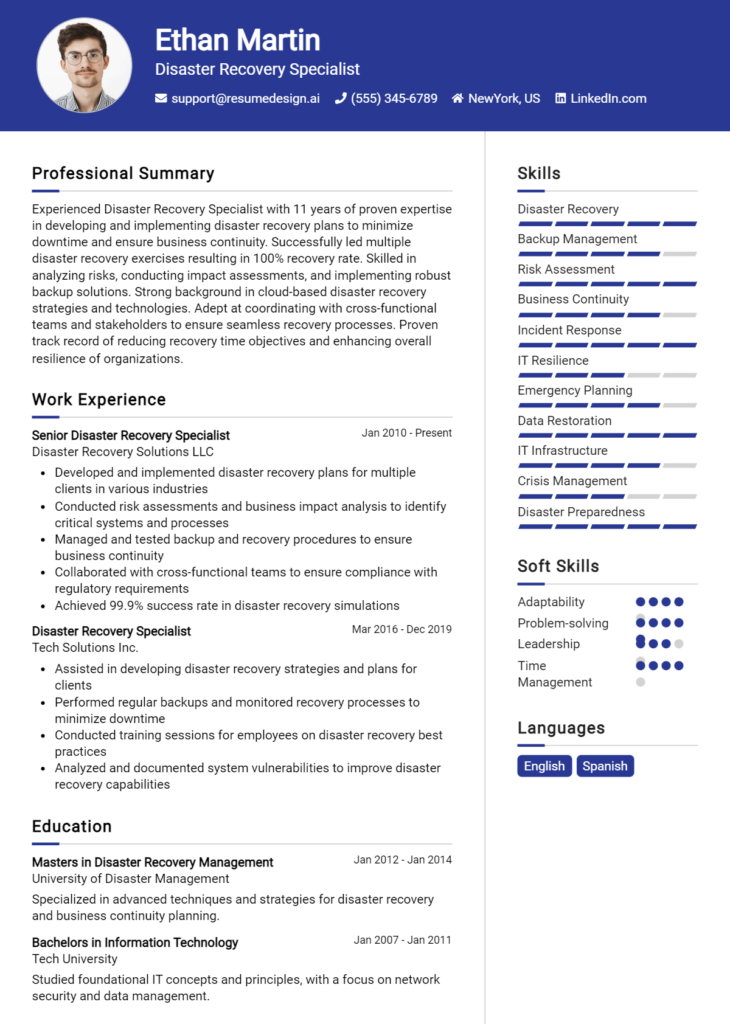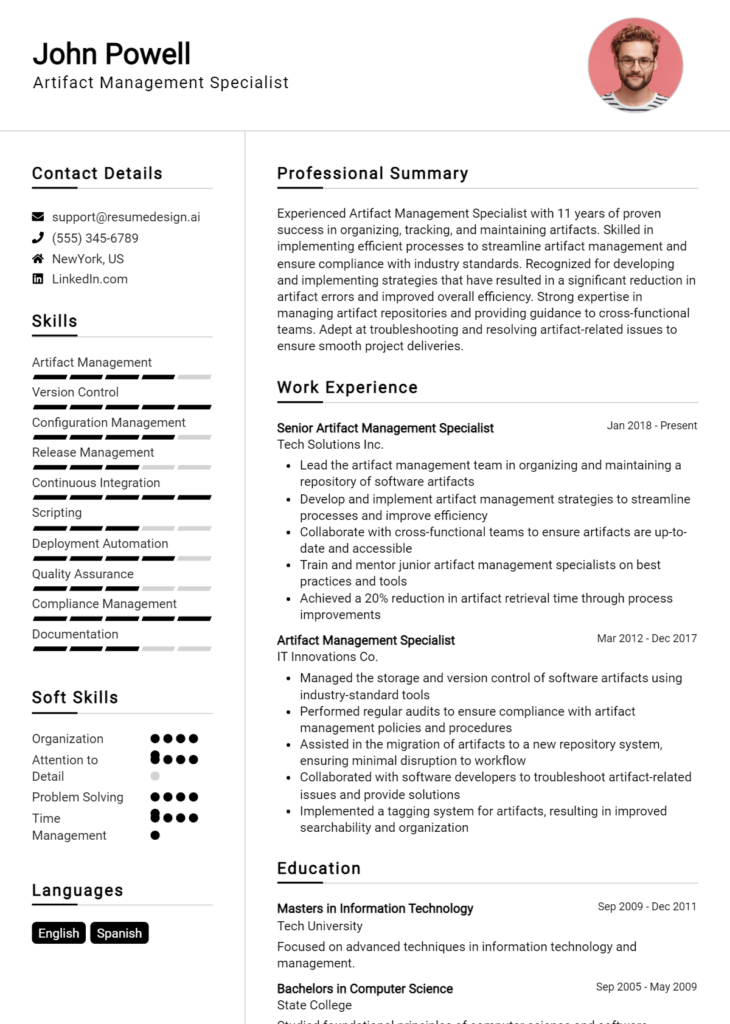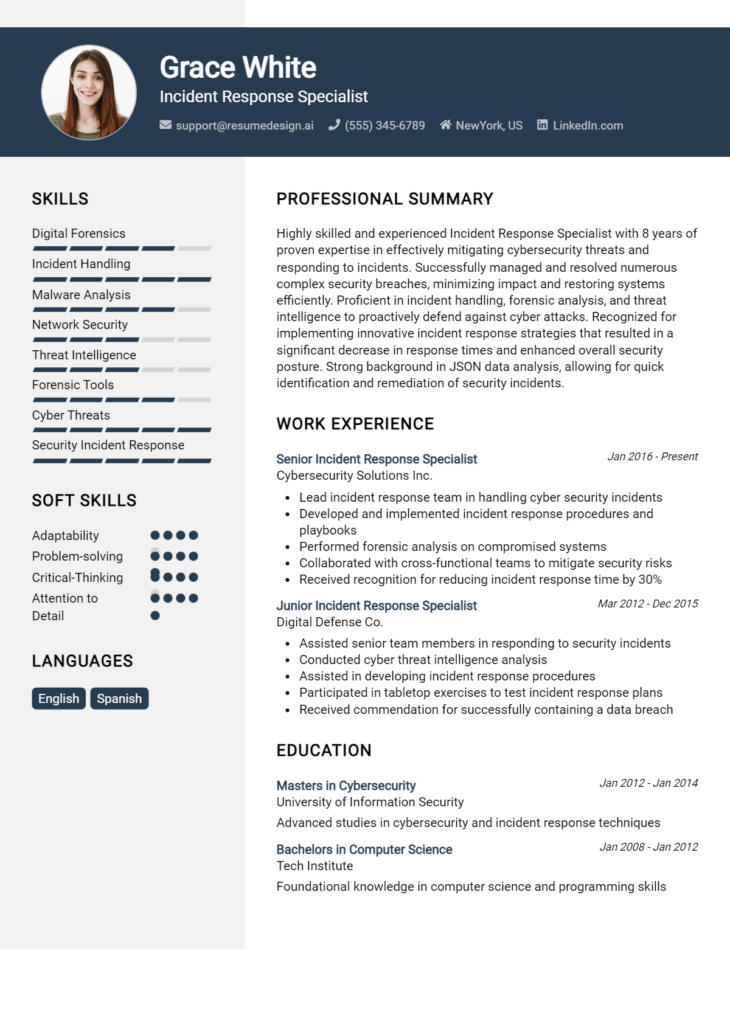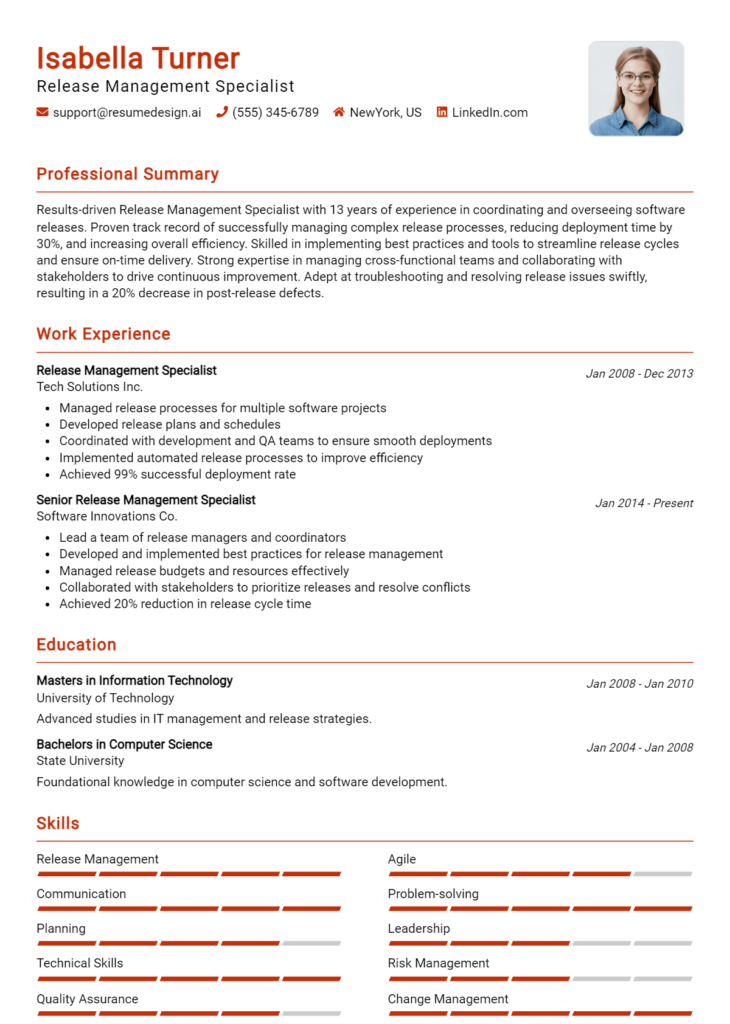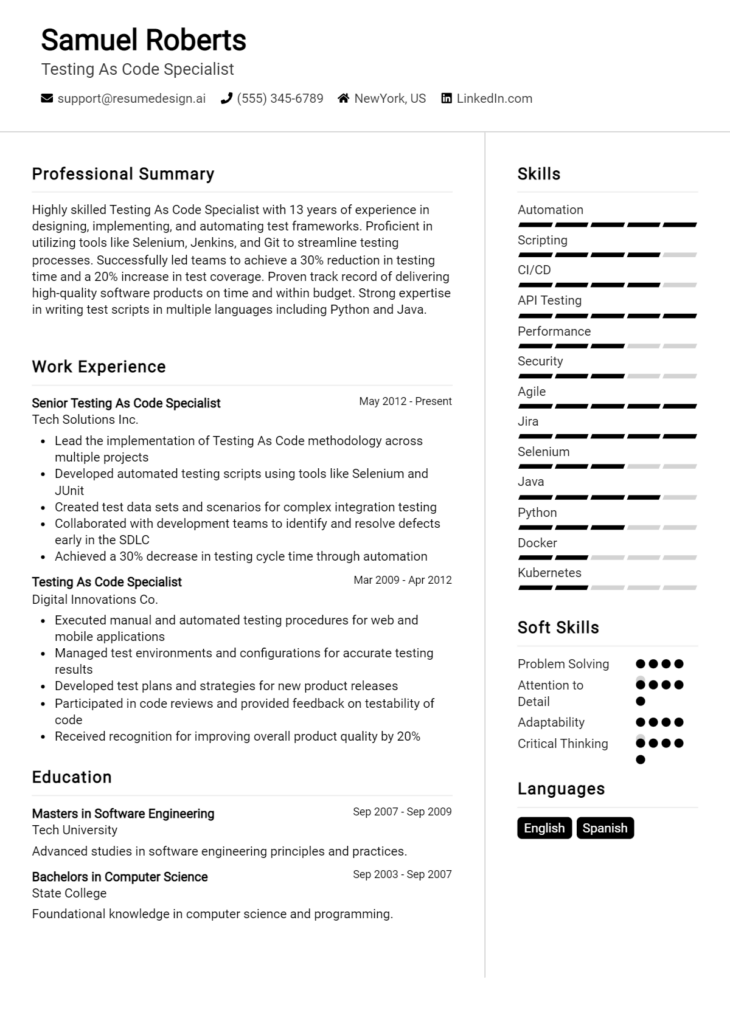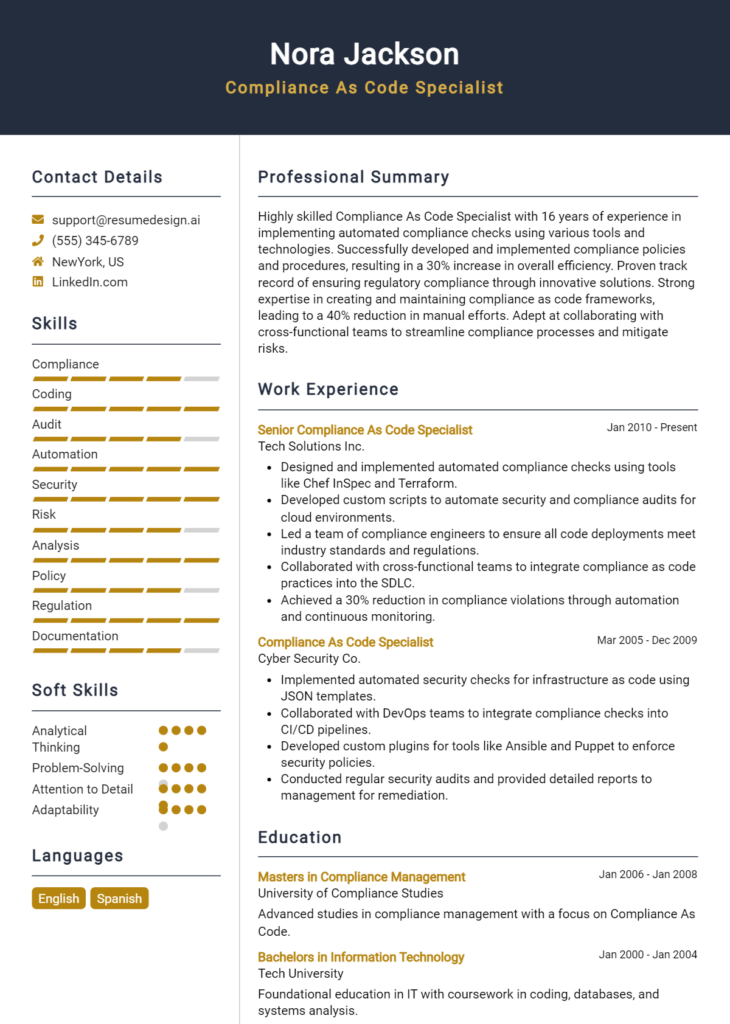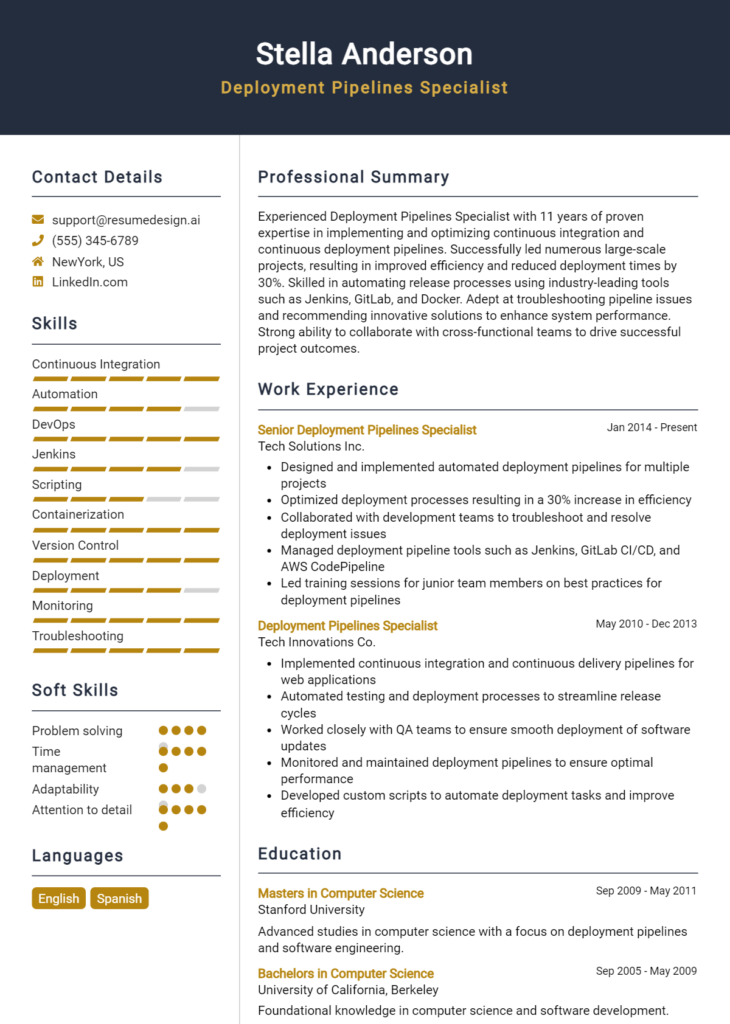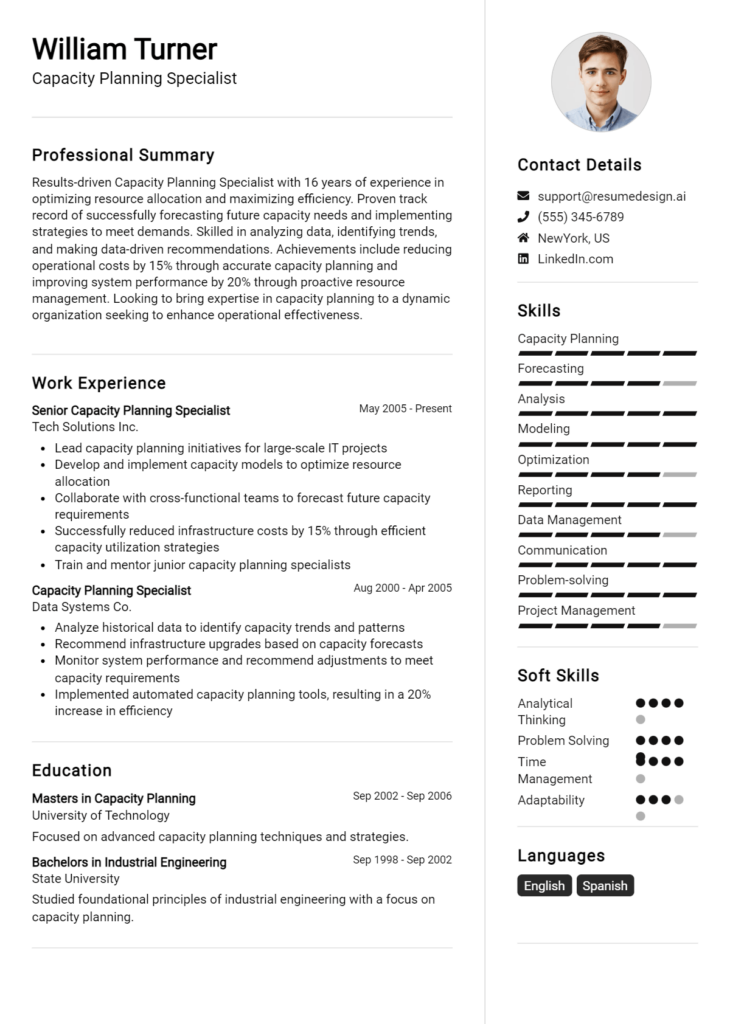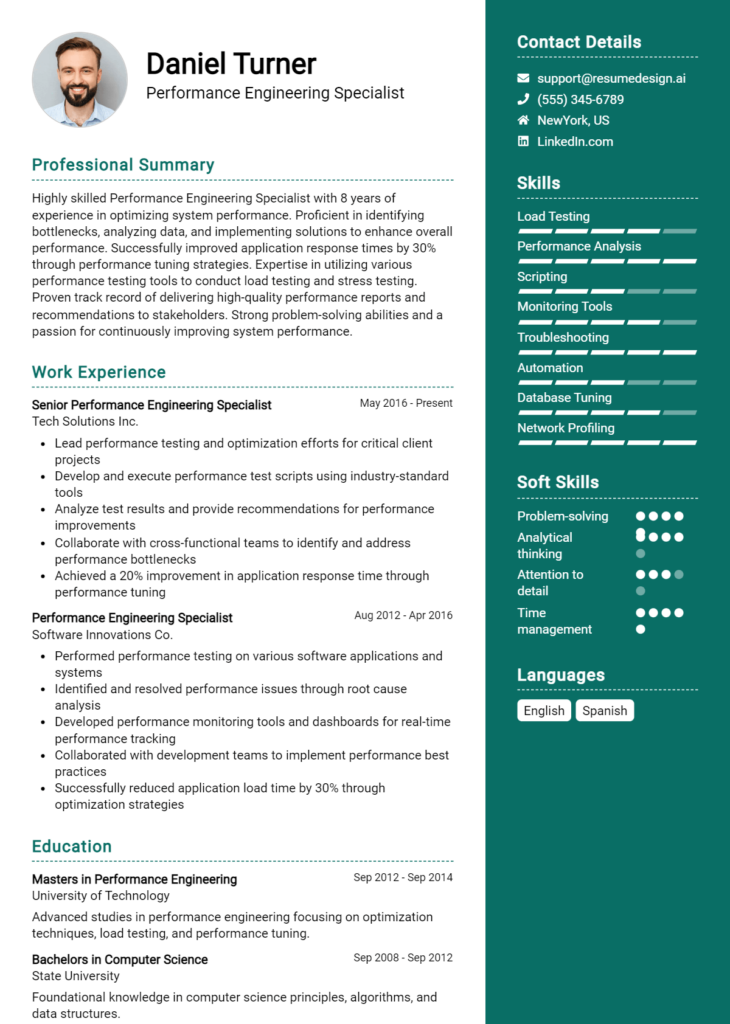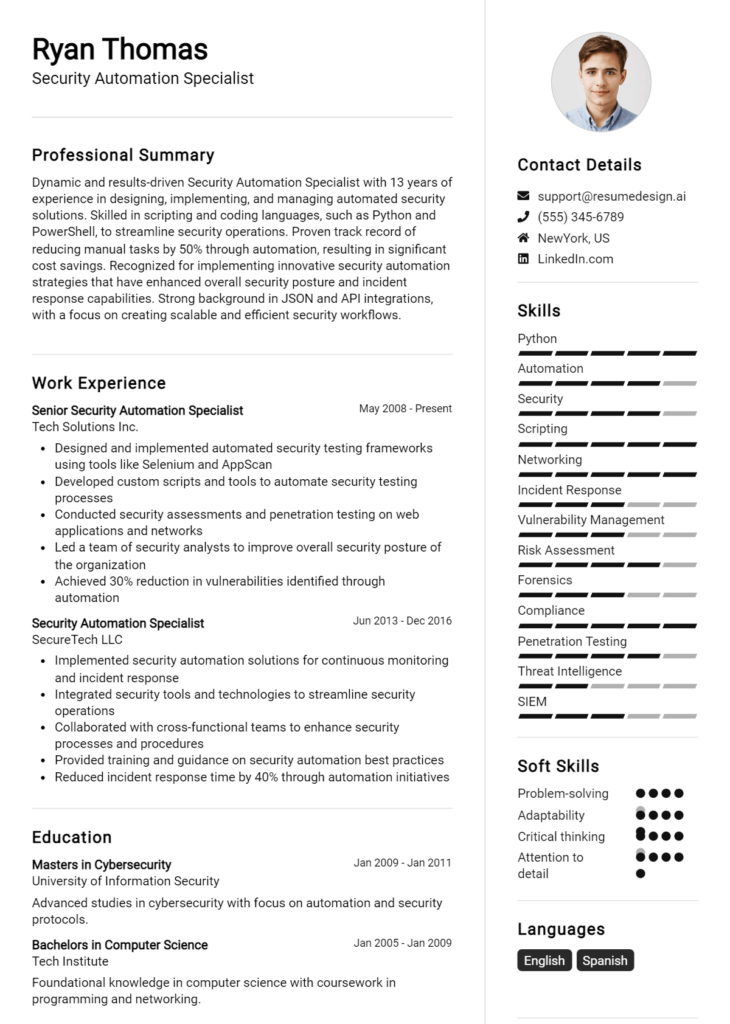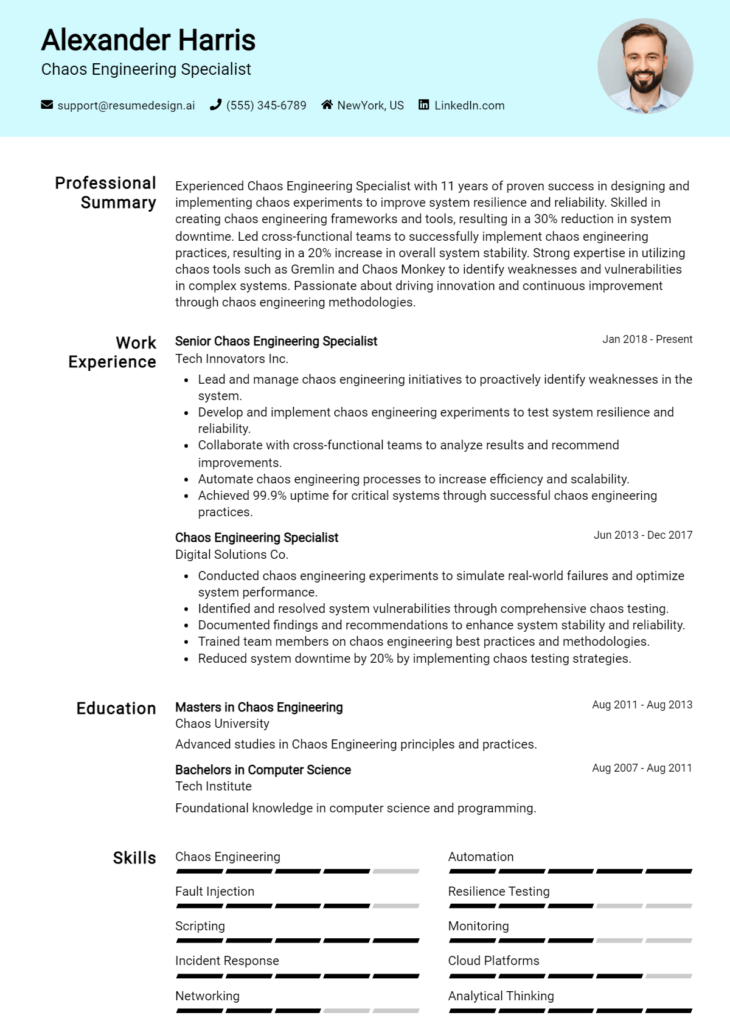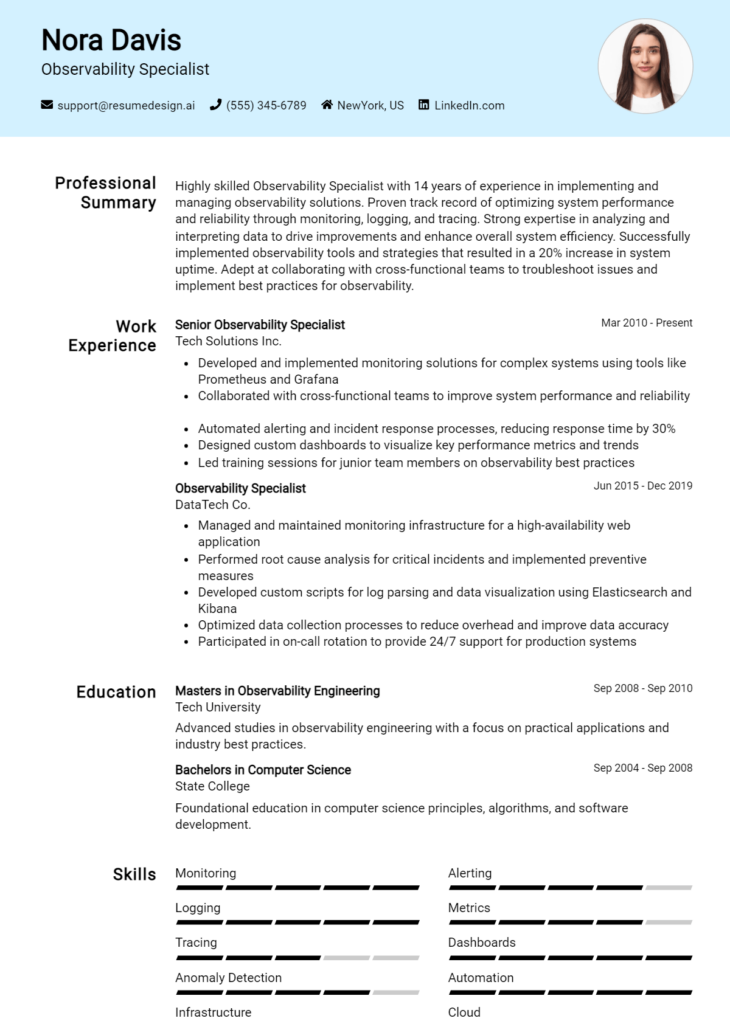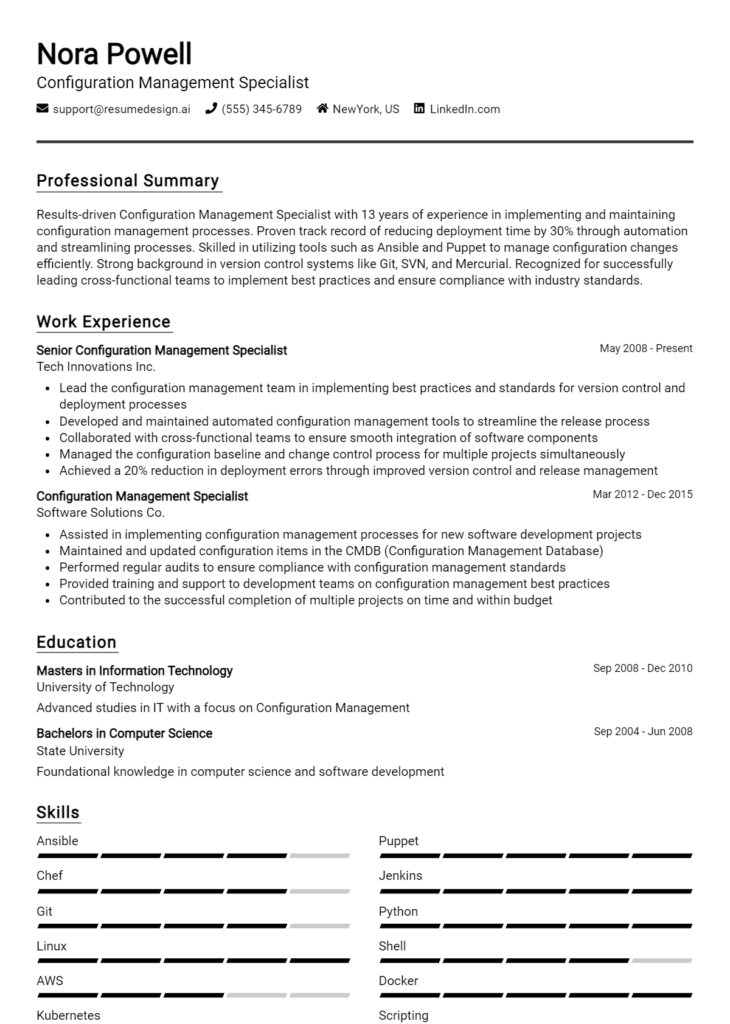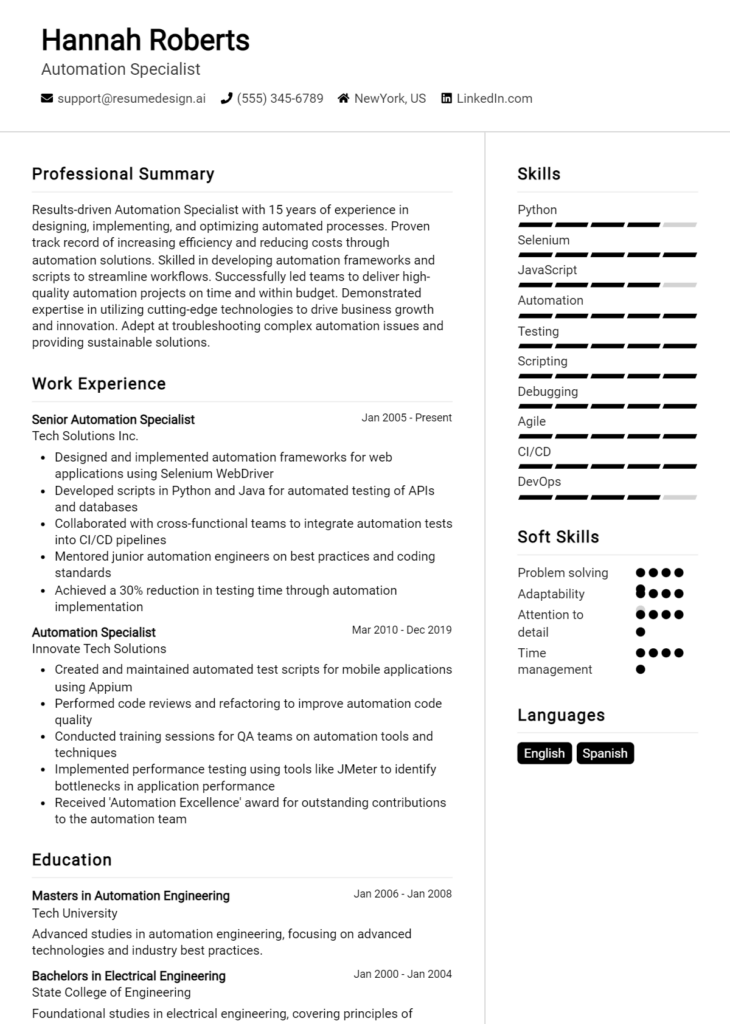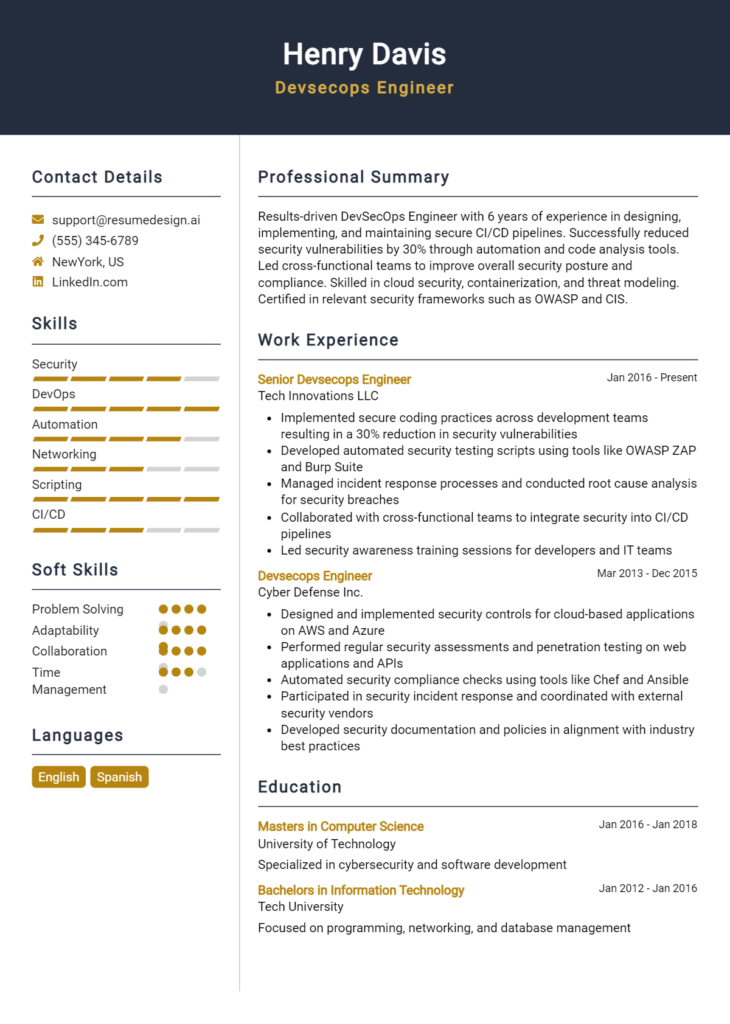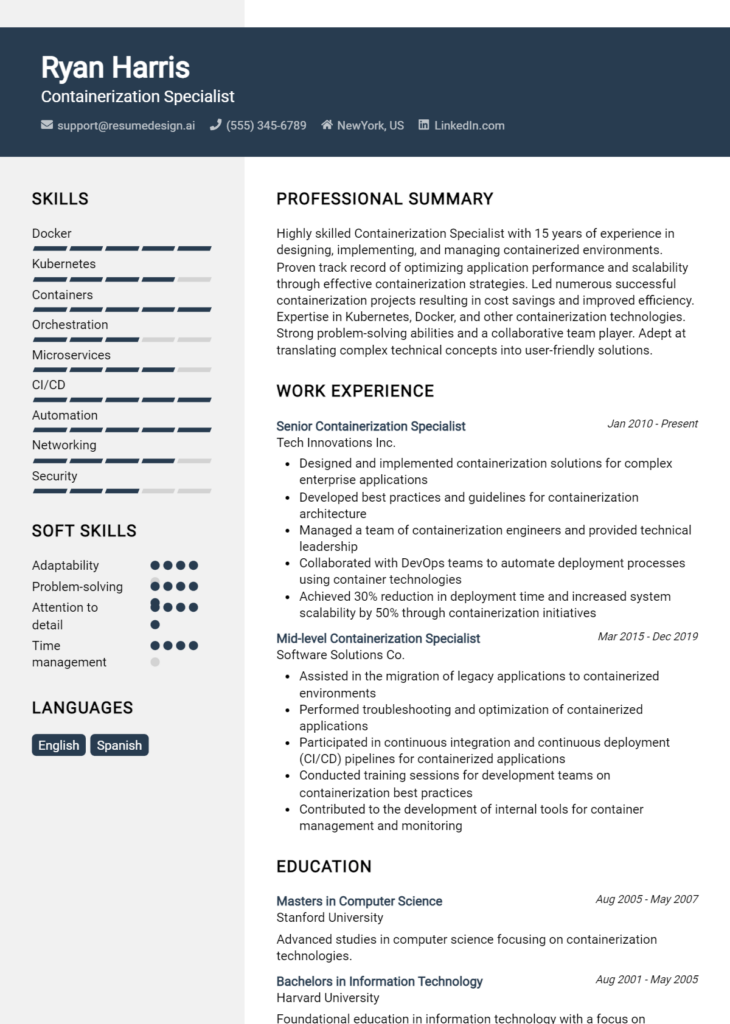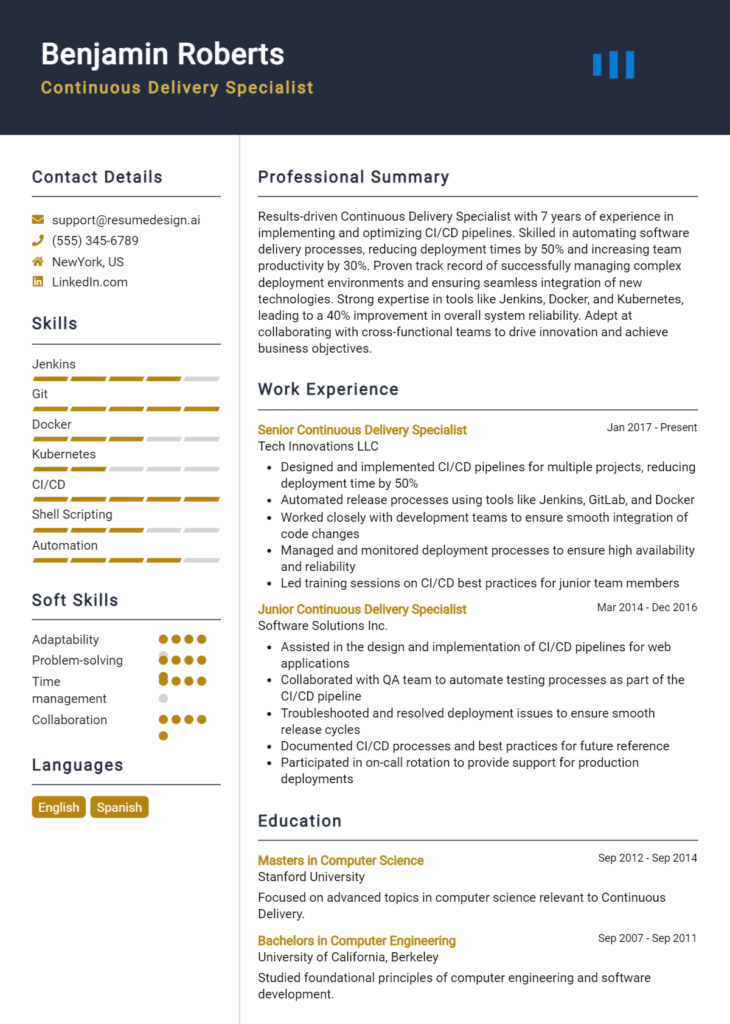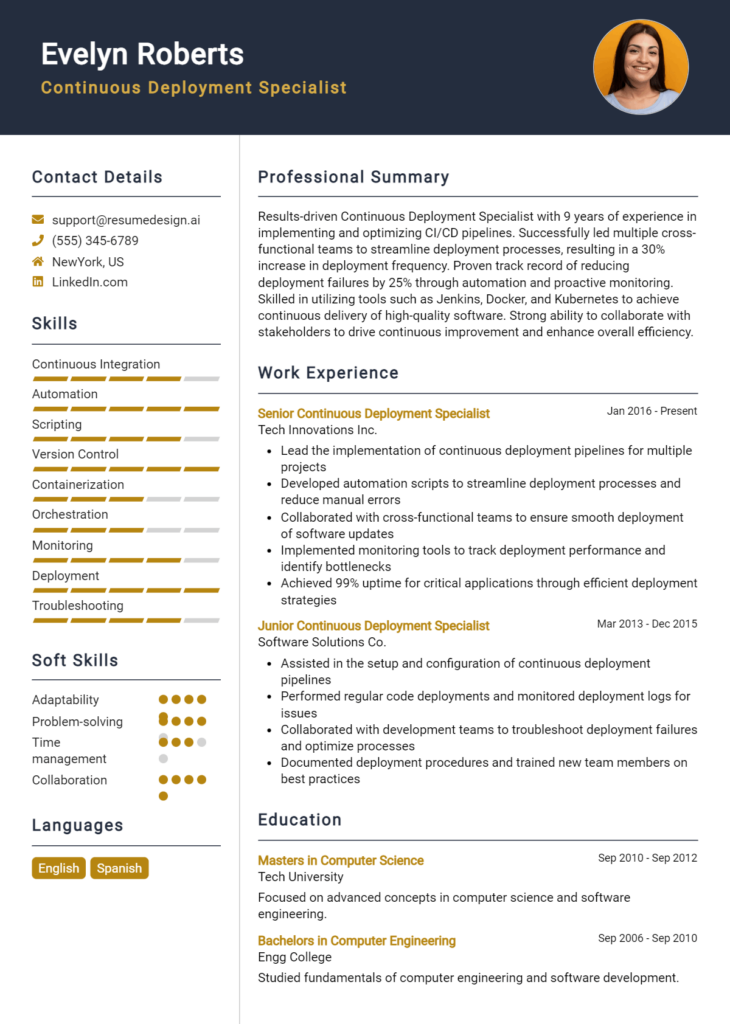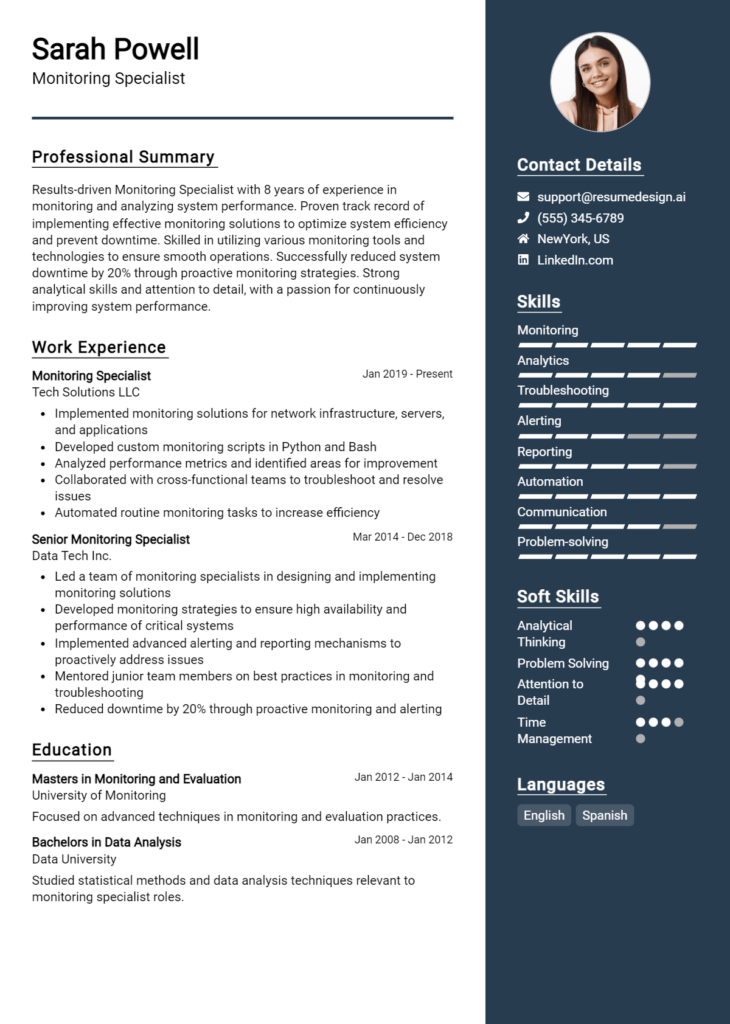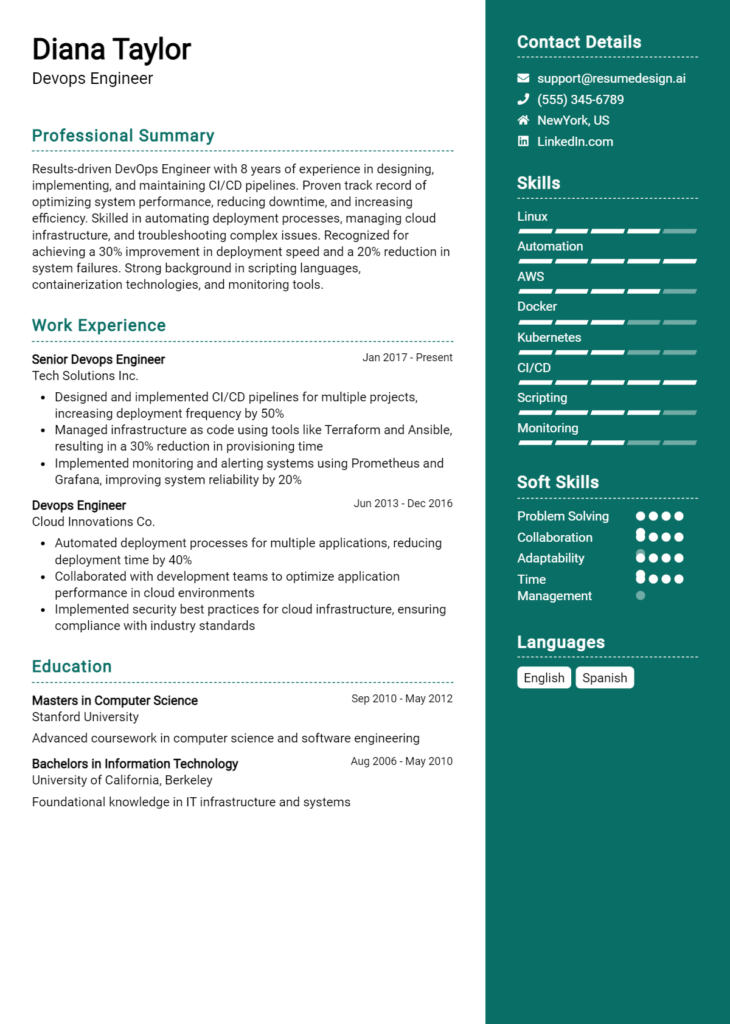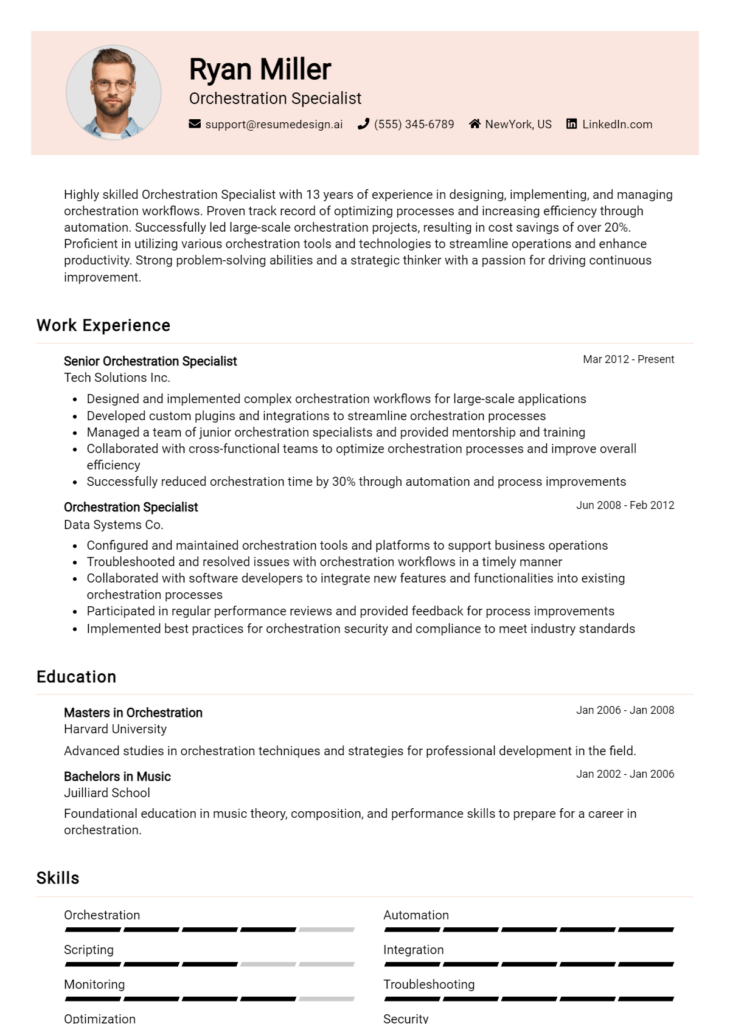Continuous Integration Specialist Core Responsibilities
A Continuous Integration Specialist plays a crucial role in enhancing software development processes by bridging gaps between development, testing, and operations teams. Their core responsibilities include implementing CI/CD pipelines, automating testing processes, and ensuring code quality. Essential skills encompass technical proficiency in version control systems, operational awareness of build environments, and strong problem-solving abilities. These competencies are vital for achieving organizational goals, and a well-structured resume can effectively highlight these qualifications, showcasing the candidate's impact on project efficiency and collaboration.
Common Responsibilities Listed on Continuous Integration Specialist Resume
- Design and implement CI/CD pipelines for software projects
- Manage version control systems and branching strategies
- Automate testing frameworks and deployment processes
- Monitor and improve build performance and reliability
- Collaborate with development and QA teams to streamline workflows
- Ensure compliance with coding standards and best practices
- Identify and resolve integration issues and bottlenecks
- Document CI/CD processes and workflows for team reference
- Evaluate and integrate new tools and technologies
- Conduct training sessions for team members on CI/CD practices
- Assist in release management and versioning strategies
- Provide support for production deployments and troubleshooting
High-Level Resume Tips for Continuous Integration Specialist Professionals
In the fast-paced world of software development, the role of a Continuous Integration Specialist is crucial for ensuring seamless integration and delivery of code. A well-crafted resume serves as the first impression a candidate makes on potential employers, making it essential to showcase not only technical skills but also significant achievements in the field. Your resume should effectively communicate your expertise in CI/CD processes, tools, and methodologies, enticing hiring managers to learn more about you. This guide will provide practical and actionable resume tips specifically tailored for Continuous Integration Specialist professionals, helping you to stand out in a competitive job market.
Top Resume Tips for Continuous Integration Specialist Professionals
- Tailor your resume to match the specific job description, incorporating relevant keywords and phrases used by the employer.
- Highlight your experience with CI/CD tools such as Jenkins, Travis CI, CircleCI, or GitLab CI to demonstrate your technical proficiency.
- Quantify your achievements by using metrics and data, such as improved deployment times or reduced error rates, to illustrate your impact.
- Include any certifications related to continuous integration, DevOps, or cloud services to validate your expertise and commitment to the field.
- Showcase your experience in version control systems like Git, emphasizing your ability to manage branching and merging strategies.
- Detail any experience with automated testing frameworks and tools, emphasizing your role in ensuring code quality and reliability.
- Highlight your collaboration skills, mentioning your experience working with cross-functional teams to enhance integration processes.
- Keep the format clean and professional, ensuring easy readability with clear headings and bullet points to organize information effectively.
- Focus on continuous learning and improvement by mentioning any recent training or workshops you have attended in relevant technologies.
- Include a section for relevant projects or contributions to open-source initiatives, showcasing your passion for the field beyond regular employment.
By implementing these tips, you can significantly increase your chances of landing a job as a Continuous Integration Specialist. A well-structured resume that accurately reflects your skills and achievements will capture the attention of hiring managers, opening doors to exciting opportunities in this dynamic field.
Why Resume Headlines & Titles are Important for Continuous Integration Specialist
In the competitive field of Continuous Integration (CI), a well-crafted resume headline or title is essential for standing out in a crowded job market. This brief yet powerful phrase acts as the first impression for hiring managers, summarizing a candidate's key qualifications and unique value proposition in just a few words. A strong headline not only grabs attention but also sets the tone for the resume by highlighting critical skills and experiences relevant to the CI specialist role. It should be concise, relevant, and specifically tailored to the job being applied for, effectively encapsulating the candidate’s expertise and readiness for the demands of the position.
Best Practices for Crafting Resume Headlines for Continuous Integration Specialist
- Keep it concise—use no more than 10-12 words.
- Make it role-specific—tailor the headline to the Continuous Integration field.
- Highlight key skills—focus on your most relevant technical and soft skills.
- Use action-oriented language—start with powerful verbs that convey impact.
- Incorporate keywords—use terms that align with the job description.
- Showcase accomplishments—include metrics or achievements if possible.
- Avoid jargon—ensure the language is clear and understandable.
- Reflect your career level—indicate whether you are entry-level, mid-level, or senior.
Example Resume Headlines for Continuous Integration Specialist
Strong Resume Headlines
Experienced Continuous Integration Specialist with a Proven Track Record of Reducing Build Times by 30%
DevOps Practitioner and CI/CD Expert Committed to Delivering High-Quality Software Solutions
Innovative CI Specialist Skilled in Automating Deployment Processes for Enhanced Efficiency
Weak Resume Headlines
Looking for a Job in Technology
Experienced Professional
Strong headlines are effective because they provide a clear and compelling snapshot of the candidate's qualifications, directly addressing the needs of the hiring manager. They incorporate specific skills and accomplishments that are relevant to the Continuous Integration field, thereby making an immediate impact. In contrast, weak headlines fail to impress due to their vagueness and lack of specificity; they do not convey any meaningful information about the candidate's expertise or how they can contribute to the organization, making them forgettable in a sea of applicants.
Writing an Exceptional Continuous Integration Specialist Resume Summary
A well-crafted resume summary is essential for a Continuous Integration Specialist as it serves as the first impression for hiring managers. A strong summary quickly captures attention by succinctly highlighting key skills, relevant experience, and notable accomplishments tailored to the specific job role. This concise overview not only showcases the candidate's qualifications but also sets the tone for the rest of the resume, ensuring that it aligns with the job description and stands out in a competitive job market.
Best Practices for Writing a Continuous Integration Specialist Resume Summary
- Quantify Achievements: Use specific numbers and metrics to demonstrate your impact, such as reduced deployment time or improved build success rates.
- Focus on Relevant Skills: Highlight technical skills that are directly related to Continuous Integration, such as proficiency with CI/CD tools and programming languages.
- Tailor for the Job Description: Customize your summary for the specific position you’re applying for by mirroring keywords and phrases from the job description.
- Keep it Concise: Aim for 2-4 sentences that encapsulate your experience and skills without overwhelming the reader.
- Showcase Problem-Solving Abilities: Mention specific challenges you have overcome and how your contributions have made a difference in teams or projects.
- Highlight Industry Experience: If applicable, include experience in specific industries that are relevant to the job to show contextual understanding.
- Use Action Verbs: Start sentences with strong action verbs to convey your contributions dynamically and assertively.
- Be Honest and Authentic: Ensure that the summary reflects your true capabilities and experiences to build trust with potential employers.
Example Continuous Integration Specialist Resume Summaries
Strong Resume Summaries
Dynamic Continuous Integration Specialist with over 5 years of experience in automating deployment pipelines, reducing lead time by 30% through effective CI/CD practices. Proficient in Jenkins, Git, and Docker, with a proven track record of enhancing software quality through rigorous testing and integration strategies.
Results-driven CI Specialist adept at streamlining development workflows, achieving a 40% increase in deployment frequency while maintaining a 98% success rate. Expertise in cloud automation and configuration management tools such as Ansible and Terraform.
Innovative Continuous Integration Engineer with a focus on agile methodologies and a history of successful project completions. Spearheaded a team initiative that decreased integration issues by 25%, leveraging tools like Travis CI and Kubernetes to optimize performance.
Weak Resume Summaries
Experienced IT professional seeking a role in Continuous Integration. Familiar with various tools and methodologies.
Continuous Integration Specialist with some knowledge of software development and integration processes. Looking to contribute to a team.
The strong resume summaries are effective because they contain specific achievements, quantifiable results, and relevant skills that directly align with the role of a Continuous Integration Specialist. They demonstrate a clear understanding of the position and highlight the candidate's unique contributions. In contrast, the weak summaries lack detail and specificity, making them generic and less impactful, ultimately failing to engage hiring managers or convey the candidate's true capabilities.
Work Experience Section for Continuous Integration Specialist Resume
The work experience section of a Continuous Integration Specialist resume is vital for demonstrating a candidate's technical skills and ability to manage teams effectively while delivering high-quality software products. This section serves as a showcase of the applicant's professional journey, highlighting their hands-on experience with CI/CD tools, automation processes, and collaboration with cross-functional teams. Quantifying achievements, such as improving deployment times or reducing bugs, adds credibility and aligns the candidate's experience with industry standards, making a compelling case to potential employers.
Best Practices for Continuous Integration Specialist Work Experience
- Focus on relevant technical skills such as CI/CD tools, version control, and automation frameworks.
- Quantify achievements with specific metrics, such as percentage improvements in deployment frequency or error rates.
- Highlight leadership roles and team management experience in CI/CD projects.
- Emphasize collaboration with developers, QA teams, and operations to foster a DevOps culture.
- Include details about tools and technologies utilized, such as Jenkins, Git, Docker, or Kubernetes.
- Showcase problem-solving capabilities by describing challenges faced and how they were overcome.
- Align your experience with industry standards and best practices for software development life cycles.
- Use action verbs to convey impact and ownership of projects and initiatives.
Example Work Experiences for Continuous Integration Specialist
Strong Experiences
- Led the implementation of a CI/CD pipeline using Jenkins, reducing deployment times by 40% and improving the overall software delivery process.
- Managed a team of 5 engineers to successfully integrate automated testing, resulting in a 30% decrease in post-release bugs.
- Collaborated with cross-functional teams to migrate legacy systems to cloud-based infrastructure, enhancing system scalability and performance by 50%.
- Developed and maintained CI/CD documentation and training materials, improving team onboarding time by 25%.
Weak Experiences
- Worked on CI/CD tasks as part of a team.
- Assisted with deployment processes and troubleshooting.
- Participated in meetings to discuss CI/CD improvements.
- Helped to maintain existing CI/CD systems.
The examples labeled as strong demonstrate clear, quantifiable outcomes and showcase leadership and collaboration, effectively illustrating the candidate's impact on projects. In contrast, the weak experiences lack specificity, measurable results, and do not convey a strong sense of ownership or accomplishment, making them less compelling to potential employers.
Education and Certifications Section for Continuous Integration Specialist Resume
The education and certifications section of a Continuous Integration Specialist resume is crucial for establishing the candidate's foundational knowledge and expertise in software development practices. This section not only highlights the academic background of the candidate but also emphasizes their commitment to continuous learning through industry-relevant certifications. By providing relevant coursework, specialized training, and recognized credentials, candidates can enhance their credibility and demonstrate alignment with the specific demands of the Continuous Integration Specialist role. An effective education and certifications section can significantly influence hiring decisions by showcasing the candidate's preparedness to contribute effectively in a fast-paced and evolving technological landscape.
Best Practices for Continuous Integration Specialist Education and Certifications
- Focus on relevant degrees in Computer Science, Software Engineering, or related fields.
- Include industry-recognized certifications such as AWS Certified DevOps Engineer or Certified Jenkins Engineer.
- Highlight specialized training in Continuous Integration tools and methodologies.
- Provide detailed descriptions of relevant coursework that pertains to CI/CD practices.
- Keep the section concise but informative, emphasizing the most relevant achievements.
- Regularly update certifications to reflect the latest industry standards and technologies.
- Include any practical experience gained during education, such as internships or projects.
- Consider adding online courses from reputable platforms that demonstrate a commitment to learning.
Example Education and Certifications for Continuous Integration Specialist
Strong Examples
- Bachelor of Science in Computer Science, XYZ University, 2020
- AWS Certified DevOps Engineer – Professional, 2021
- Jenkins Certification from CloudBees, 2022
- Coursework: Software Development Lifecycle, Continuous Integration and Deployment, Agile Methodologies
Weak Examples
- Bachelor of Arts in History, ABC College, 2018
- Certification in Basic Office Software, 2019
- Old certification in a discontinued CI tool, 2020
- Coursework: Introduction to Business Management
The strong examples presented above are considered relevant and aligned with the role of a Continuous Integration Specialist, showcasing specific degrees, certifications, and coursework that directly apply to the field. In contrast, the weak examples reflect qualifications that lack relevance to the position, such as degrees in unrelated fields or outdated certifications that do not support the candidate's expertise in Continuous Integration practices. This distinction highlights the importance of tailoring educational qualifications to meet industry demands and job requirements.
Top Skills & Keywords for Continuous Integration Specialist Resume
As a Continuous Integration Specialist, showcasing your skills effectively in your resume is paramount. The role demands a unique blend of technical expertise and interpersonal abilities to ensure smooth integration processes and collaboration within teams. Highlighting both hard and soft skills not only demonstrates your qualifications but also helps potential employers understand your fit within their organization. Given the dynamic nature of software development, a well-structured resume that emphasizes relevant skills can significantly enhance your chances of landing an interview.
Top Hard & Soft Skills for Continuous Integration Specialist
Soft Skills
- Effective Communication
- Problem-Solving
- Team Collaboration
- Adaptability
- Time Management
- Attention to Detail
- Critical Thinking
- Conflict Resolution
- Proactive Learning
- Creativity
Hard Skills
- CI/CD Tools (Jenkins, GitLab CI, CircleCI)
- Version Control Systems (Git, SVN)
- Cloud Computing (AWS, Azure, Google Cloud)
- Scripting Languages (Python, Bash)
- Configuration Management (Ansible, Puppet, Chef)
- Containerization (Docker, Kubernetes)
- Automated Testing Frameworks
- Monitoring Tools (Prometheus, Grafana)
- Build Tools (Maven, Gradle)
- Agile Methodologies
Stand Out with a Winning Continuous Integration Specialist Cover Letter
Dear [Hiring Manager's Name],
I am excited to apply for the Continuous Integration Specialist position at [Company Name], as advertised on [Job Board/Company Website]. With a solid background in software development and a deep understanding of CI/CD pipelines, I am confident in my ability to enhance your team's efficiency and streamline your deployment processes. My experience with automation tools, version control systems, and agile methodologies has equipped me with the skills necessary to contribute effectively to your organization.
In my previous role at [Previous Company Name], I was responsible for implementing a robust continuous integration pipeline that reduced our release cycle time by 30%. By leveraging tools such as Jenkins and GitLab CI, I automated testing and deployment processes, which not only increased our software quality but also improved team collaboration. I took the initiative to conduct training sessions for the development team on best practices in CI, ensuring that everyone understood the importance of maintaining a seamless workflow. My proactive approach has consistently led to the successful delivery of projects on time and within scope.
I am particularly drawn to the innovative projects at [Company Name] and your commitment to continuous improvement. I believe my technical expertise, combined with my passion for collaboration and problem-solving, aligns perfectly with your team's goals. I am eager to bring my knowledge of containerization technologies, such as Docker and Kubernetes, to further enhance your CI/CD practices and drive the success of your software development lifecycle.
Thank you for considering my application. I look forward to the opportunity to discuss how my experience and vision for continuous integration can contribute to the ongoing success of [Company Name]. I am excited about the possibility of working together to create efficient and effective deployment solutions.
Sincerely,
[Your Name]
[Your LinkedIn Profile]
[Your Contact Information]
Common Mistakes to Avoid in a Continuous Integration Specialist Resume
When crafting a resume for a Continuous Integration Specialist position, it's crucial to present your skills and experiences effectively. However, many candidates make common mistakes that can undermine their chances of landing an interview. Awareness of these pitfalls can help you create a more compelling resume that highlights your qualifications and aligns with the expectations of hiring managers in the tech industry.
Lack of Specificity: Vague descriptions of past experiences can make it difficult for employers to understand your contributions. Always quantify your achievements with specific metrics or outcomes.
Ignoring Relevant Tools and Technologies: Failing to mention specific CI/CD tools (like Jenkins, GitLab CI, or CircleCI) may lead hiring managers to overlook your expertise in automation processes.
Neglecting Soft Skills: While technical skills are essential, soft skills such as communication, teamwork, and problem-solving are equally important in a CI role. Be sure to include examples that demonstrate these qualities.
Overlooking Continuous Learning: The field of continuous integration is always evolving. Not mentioning any recent certifications, courses, or workshops can give the impression that you are not keeping up with industry trends.
Poor Formatting: A cluttered or confusing layout can detract from your resume's content. Use clear headings, bullet points, and consistent formatting to enhance readability.
Lack of Customization: Sending out a generic resume for every application can be detrimental. Tailor your resume to align with the specific job description and requirements for each position.
Ignoring the Importance of Collaboration Experience: Continuous integration is often a team effort. Failing to highlight your experience working with cross-functional teams can make it seem like you lack collaborative skills.
Excluding Personal Projects or Contributions: If you have relevant personal projects, open-source contributions, or freelance work, don’t hesitate to include them. These experiences can demonstrate your passion and initiative in the field.
Conclusion
As a Continuous Integration Specialist, you play a vital role in streamlining development processes and ensuring software quality through automated testing and deployment. Throughout this article, we explored the essential skills and qualifications necessary for this role, including expertise in CI/CD tools, version control systems, and strong problem-solving abilities. We also highlighted the importance of collaboration with cross-functional teams to foster an agile development environment.
To enhance your career prospects as a Continuous Integration Specialist, it's crucial to present a compelling resume that showcases your unique skills and experiences. We encourage you to take a moment to review your resume and ensure it reflects your capabilities effectively.
To assist you in this endeavor, a variety of resources are available at your fingertips. Explore our resume templates to find a design that suits your style, or utilize our resume builder for an easy and efficient way to create a professional resume. If you're looking for inspiration, check out our resume examples to see how others in your field have successfully presented their qualifications. Additionally, don't forget to craft a strong first impression with a polished cover letter using our cover letter templates.
Now is the time to invest in your future—take advantage of these tools to elevate your resume and stand out in the competitive job market for Continuous Integration Specialists!

